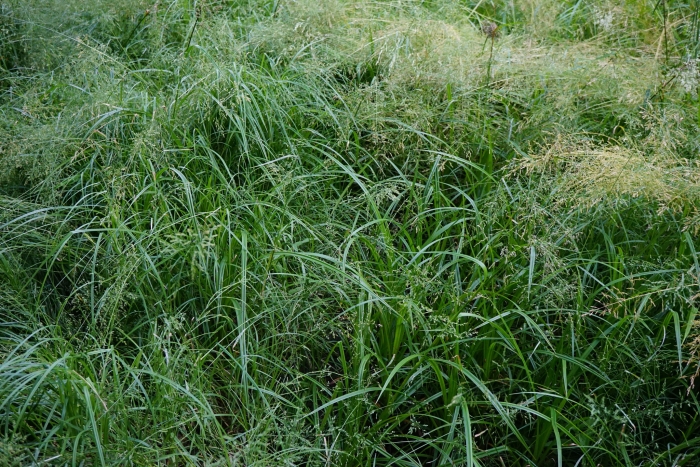Rough Bluegrass
(Poa trivialis)
Rough Bluegrass (Poa trivialis)
/
/

Patrick Hacker
CC BY 4.0
Image By:
Patrick Hacker
Recorded By:
Copyright:
CC BY 4.0
Copyright Notice:
Photo by: Patrick Hacker | License Type: CC BY 4.0 | License URL: http://creativecommons.org/licenses/by/4.0/ | Rights Holder: Patrick Hacker | Publisher: iNaturalist | Date Created: 2021-06-18T18:10:15-07:00 |























Estimated Native Range
Summary
Poa trivialis, commonly known as Rough Bluegrass, is a perennial grass that is often evergreen but can be semi-deciduous in colder climates. It is native to a variety of habitats including open woodlands, meadows, and riverbanks in Europe, Central Asia, the Middle East, North Africa, and the western Himalayas. This species typically forms a dense turf with a fine texture, growing 30 to 60 cm (1 to 2 ft.) in height. The leaves are shiny, broad, and tapering, with very rough sheaths, while the stems are slender. Rough Bluegrass is notable for its loose, whorled green panicle that is much branched and 15 cm (6 in.) long, with egg-shaped spikelets. It flowers from June throughout the summer, with the panicles adding a delicate texture to the landscape.
Rough Bluegrass is valued for its ability to cope with the polluted atmosphere of towns and cities, making it a suitable choice for urban green spaces. It is used as an ornamental grass in gardens and can provide a lush ground cover. However, it requires consistent moisture and does not tolerate drought well. It prefers part shade but can tolerate a range of light conditions, and it grows best in soils with medium to slow drainage. While it can be a beautiful addition to gardens, Poa trivialis is potentially invasive in some regions, such as the United States, and should be planted with caution outside its native range.CC BY-SA 4.0
Rough Bluegrass is valued for its ability to cope with the polluted atmosphere of towns and cities, making it a suitable choice for urban green spaces. It is used as an ornamental grass in gardens and can provide a lush ground cover. However, it requires consistent moisture and does not tolerate drought well. It prefers part shade but can tolerate a range of light conditions, and it grows best in soils with medium to slow drainage. While it can be a beautiful addition to gardens, Poa trivialis is potentially invasive in some regions, such as the United States, and should be planted with caution outside its native range.CC BY-SA 4.0
Plant Description
- Plant Type: Grass
- Height: 1.5-3 feet
- Width: 0.15-0.3 feet
- Growth Rate: Moderate
- Flower Color: N/A
- Flowering Season: Spring
- Leaf Retention: Semi-Deciduous
Growth Requirements
- Sun: Part Shade
- Water: Medium
- Drainage: Medium, Slow
Common Uses
Deer Resistant, Erosion Control, Low Maintenance
Natural Habitat
Native to open woodlands, meadows, and riverbanks
Other Names
Common Names: Rough Meadow Grass, Fowl Bluegrass, Rough-Stalk Bluegrass, Rough-Stalk Meadow Grass, Almindelig Rapgræs, Gewöhnliches Rispengras, Gemeines Rispengras, Poa Común, Espiguilla, Pâturin Commun
Scientific Names: , Poa trivialis, Poa trivialis subsp. sylvicola, Poa sylvicola, Poa trivialis var. glabra, Poa trivialis var. sylvicola, Poa attica, Poa callida, Poa trivialis var. parviflora, Poa trivialis var. effusa
GBIF Accepted Name: Poa trivialis L.